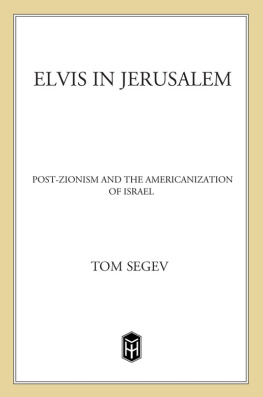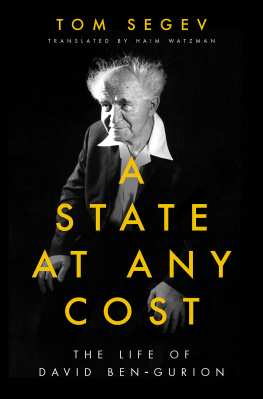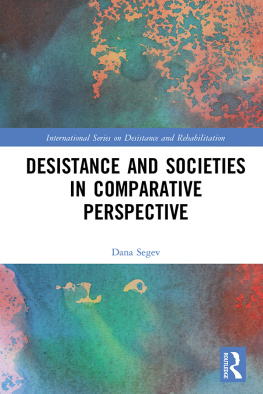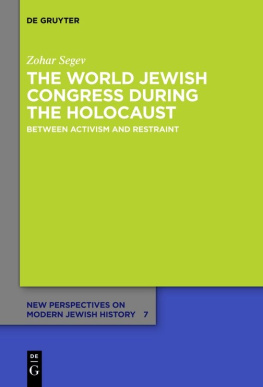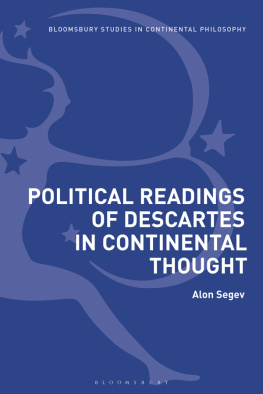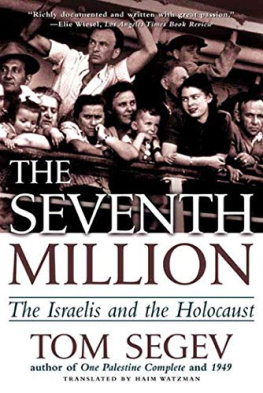Tom Segev is a columnist for Haaretz, Israels leading newspaper. He is author of three now-classic works on the history of Israel, among them One Palestine, Complete: Jews and Arabs Under the British Mandate, which received the National Jewish Book Award and was a New York Times Editors Choice of 2000. He lives in Jerusalem.
J ust a few minutes after Likud parliamentarian Moshe Katzav was elected Israels eighth president, Limor Livnat, a Knesset member from the same party, who would soon become minister of education in Ariel Sharons government, described his success as the victory of Zionism over post-Zionism. The truth is that Katzavs margin of victory had come from Shas, the non-Zionist, ultra-Orthodox party. Shimon Peres, the losing candidate, is one of the states founding fathers. Livnats declaration demonstrated the rights tendency to monopolize Zionism; once the left had done the same.
Either way, Katzavs biography is very Israeli. His is an American-style success story. Born in Iran, he came to Israel as a boy, grew up in immigrant transit camps, and raised himself to the countrys highest office. Conclusion: every boy cangrow up to be president. Just like in America. Katzav is a religious man, and his spoken Hebrew betrays his country of origin. He is a very Jewish Israeli.
The country he serves as president differs greatly from the one he found when he came as a child. Never has Israel been farther from the vision of David Ben-Gurion, yet in the past fifty years, the Zionist movement has come close to realizing all its goals. Soon, for the first time in two millennia, the largest Jewish community in the world will be in Israel. Most of the Jews who want to settle in the country will have done so by then; henceforth, the ingathering of the Exiles will be but a thin stream of immigrants. The Law of Return will, for all intents and purposes, have lost its meaning. Presumably the number of Jews in the world will decline, largely as a result of intermarriage. The relative proportion of ultra-Orthodox non-Zionists among those remaining will grow. When that happens, Israel will have entered the age of post-Zionism. Zionism, if at all relevant, may no longer be useful for describing the nature of the relations between Israel and the Jewish world. At most, it would define relations between Israelis and Arabs and among Israelis themselves.
But then, at the end of 1999, as more and more Israelis seemed to be adopting post-Zionist concepts, a new intifada broke out and the Oslo process fell apart. On the right, no one was surprised. We told you there was no one to talk to, they said. On the left, some people were taken aback, while some were insulted. How could you do this to us? they said totheir Palestinian friends. Now, of all times, when were ready to talk about partitioning Jerusalem. As elections for prime minister approached in 2001, Israelis began to think that there was no solution to the conflict, at least not in their generation. Perhaps it is possible to manage the conflict through partial arrangements, but it is apparently impossible to resolve.
In the creeping post-Zionist atmosphere of a certain indifference toward politics and ideology, there was a strange, even forced, aspect to the renewed confrontation with existential questionsquestions that for many had seemed part of the past. The most pressing of these was the right of return for Palestinian refugees who had either fled or been driven out of the country in 1948. A group of Israeli peace activists, among them the novelists Amos Oz and A. B. Yehoshua, published a full-page advertisement in Haaretz rejecting the refugees right of return: We recognize the urgent and real need to solve the problem of the 1948 refugees, they wrote. We also recognize the State of Israels partial responsibility for creating the problem. These refugees will have the right to return to their homeland, Palestine, and settle there. But we wish to make clear that we cannot agree to the refugees return to the territory that is part of the State of Israel, because that is tantamount to Israels destruction. There can certainly be humanitarian solutions regarding the unification of individual families, but an across-the-board return of Palestinian refugees to Israel contradicts the principle of the right of self-determination for the Jewish people. Alongside the right of self-determination for Palestinians, this principle constitutesthe moral basis for the agreement that will be signed between the two peoples.
In the twenty years prior to the Oslo agreement, several of Israels inviolable thou shalt nots were broken, including the prohibitions against negotiating with the PLO, giving up territories without peace, agreeing to a Palestinian state, and in the end discussing the division of Jerusalem. The willingness of the advertisements signatories to recognize Israels partial responsibility for the Palestinian tragedy broke another taboo. So it is not totally outside the realm of possibility that Israel will someday also recognize the refugees right of return. However, at the time, the refusal to recognize Palestinian right of return was a matter of very broad Israeli consensus.
Then Ariel Sharon became prime minister. Ehud Barak was not ousted for betraying the nations sacred values but mostly because he failed to reach an agreement with the Palestinians. Shass voters punished him because of the attempt during his tenure to interfere with their school system and impose a foreign secular worldview. Arab voters boycotted the elections to protest the deaths of thirteen Arab-Israeli demonstrators shot by police during disturbances at the outbreak of the new intifada.
In his seventies, Sharon comes from the countrys founding generation. He is a mythological figure, larger than life, and represents the spirit of the 1950s. Fittingly, he described the new intifada as another round of Israels War of Independence; Israelis have responded by falling back into the tribal siege mentality that marked the states early days and calling forunity, along the lines of the original Zionist struggle. The minister of education has begun to phase out the new history textbooks, replacing them with older, more Zionist ones. Commentators have reverted to condemning criticism from the outside world, particulary from Europe, as anti-Israeli, even as disguised anti-Semitism. Israelis voice fewer objections to violations of Palestinian human rights, including torture. As bombs continue to explode in towns all over Israel, walls in downtown Jerusalem have been covered with graffiti that proclaims, No ArabsNo Terror. Once again, it has become acceptable to hate Arabs openly.
At times, history seems to have turned backward. A comment made by British major general Bernard Montgomery comes to mind: The Jew murders the Arab and the Arab murders the Jew. This is what is going on in Palestine now, and it will go on for the next fifty years in all probability. Unlike the British, however, Israelis and Palestinians have nowhere to go. Meanwhile, Palestinian terror has pushed Israel back into the Zionist womb; this may be the Palestinians idea of revenge. Hence post-Zionism is out at present. But the deeper developments that indicated a post-Zionist future were evidence of something Israelis had begun to recognize: There is life after Zionism.

